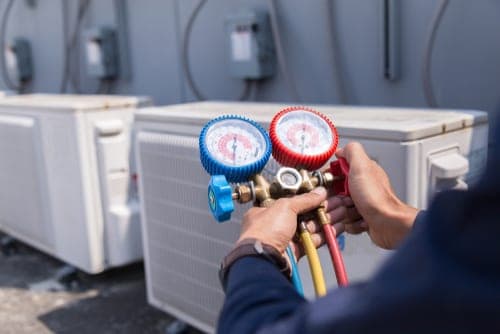Energy-Efficient Cooling And Heating Equipments to Reduce Utility Bills
As energy prices remain to increase, the relevance of energy-efficient HVAC systems becomes increasingly obvious. These systems not just guarantee significant financial savings on energy costs yet additionally add to an extra lasting future by decreasing power usage. With different options available, consisting of geothermal heatpump and ductless mini-splits, residential or commercial property owners face a plethora of selections that can improve comfort and air top quality. Understanding the vital functions and maintenance demands is vital to making the most of these benefits. What aspects should be prioritized when picking the best system for your demands?
Advantages of Energy-Efficient HVAC Solutions
Energy-efficient Heating and cooling systems use countless benefits that extend beyond simple expense savings. By taking in much less energy, these systems contribute to lower greenhouse gas discharges, assisting to deal with climate modification and promote sustainability.
Furthermore, energy-efficient cooling and heating systems typically supply boosted convenience degrees. Much of these systems include innovative modern technology that enables far better temperature level control and boosted air top quality (DMAKS HVAC). This brings about a much healthier interior setting, which is specifically vital for people with allergic reactions or breathing problems
Moreover, spending in energy-efficient a/c systems can improve residential or commercial property value. As more consumers focus on power performance, homes and structures furnished with these systems might attract higher quotes in the property market.
Kinds Of Energy-Efficient A/c Options
How can home owners and businesses pick the most appropriate energy-efficient HVAC alternatives for their needs? The market provides a range of energy-efficient cooling and heating systems, each designed to enhance convenience while reducing power usage.
One choice is the variable cooling agent circulation (VRF) system, which successfully regulates the temperature level in several zones within a building. This system adjusts its refrigerant circulation to match the wanted temperature, causing substantial power savings.
One more preferred option is geothermal warm pumps, which utilize the earth's steady temperature level to warmth and amazing areas. By transferring warm to and from the ground, these systems demonstrate impressive effectiveness, particularly in moderate environments.
In addition, ductless mini-split systems offer an energy-efficient option for homes doing not have ductwork. These systems permit zone-specific heating & cooling, decreasing power waste in unoccupied locations.
Finally, high-efficiency furnaces and a/c unit, with advanced SEER and AFUE scores, supply reputable environment control while taking in less power than typical versions. By evaluating these alternatives, homeowners and organizations can choose a heating and cooling system customized to their particular demands and power performance objectives.
Secret Attributes to Think About

Following, check out the kind of compressor made use of in the system. DMAKS HVAC. Variable-speed compressors can readjust their outcome to match the home heating or cooling demand, bring about boosted comfort and power savings compared to single-speed versions. In addition, look for systems equipped with clever thermostats that offer programmable settings and remote gain access to, permitting far better control over energy usage
One more essential function is the system's air purification ability. High-efficiency filters can boost indoor air top quality and reduce energy usage by making sure the system operates effectively. Consider the type of refrigerant made use of; contemporary systems frequently employ eco-friendly cooling agents that have a lower environmental effect.
Finally, ensure that the system works with zoning technology, which enables for customized temperature control in various check my site locations of your home, enhancing convenience while minimizing power usage.
Tips for Choosing the Right System


Next, think about energy efficiency scores, specifically the Seasonal Energy Effectiveness Ratio (SEER) for cooling systems and the Annual Gas Use Performance (AFUE) for heating systems. Greater scores suggest greater performance, which can cause significant savings on energy expenses over time.
In addition, assess the sort of HVAC system that ideal suits your way of living and budget plan. Options consist of central air conditioning, ductless mini-splits, and heatpump, each with its own collection of advantages and drawbacks.
Do not neglect the relevance of appropriate installation and sizing; an improperly sized system can lead to ineffectiveness and increased wear. Consult with a specialist Heating and cooling service provider to obtain skilled referrals tailored to your home's special needs. This extensive technique will certainly guarantee that you choose an energy-efficient HVAC system that satisfies your requirements and spending plan efficiently.
Upkeep for Optimum Efficiency
Once the ideal HVAC system is in location, recurring maintenance ends up being vital to ensuring ideal performance and longevity. A properly maintained system operates much more successfully, resulting in lower power intake and decreased utility bills. Normal examinations and tune-ups ought to be set up a minimum of two times a year-- as soon as before the cooling season and once before the heating period.

Home owners ought to additionally be alert about monitoring their HVAC system's performance. Uncommon noises, changing temperature levels, or enhanced power bills can suggest underlying concerns that need prompt attention. By dealing with these problems quickly, home owners can prevent expensive fixings and extend the life expectancy of their systems.
Purchasing an upkeep plan with a qualified service technician not just enhances effectiveness yet also supplies assurance, knowing that the system is operating at its ideal. DMAKS HVAC. Regular maintenance is as a result crucial for sustaining energy effectiveness and lowering total operational costs
Final Thought
Finally, energy-efficient HVAC systems provide a feasible remedy for decreasing energy bills while boosting convenience and air quality. By integrating innovative innovations and alternatives such as geothermal heatpump and ductless mini-splits, homeowner can accomplish substantial energy financial savings and contribute to environmental sustainability. Careful consideration of system features and recurring upkeep better makes certain optimum efficiency, making energy-efficient systems a sensible investment for both economic and ecological advantages.